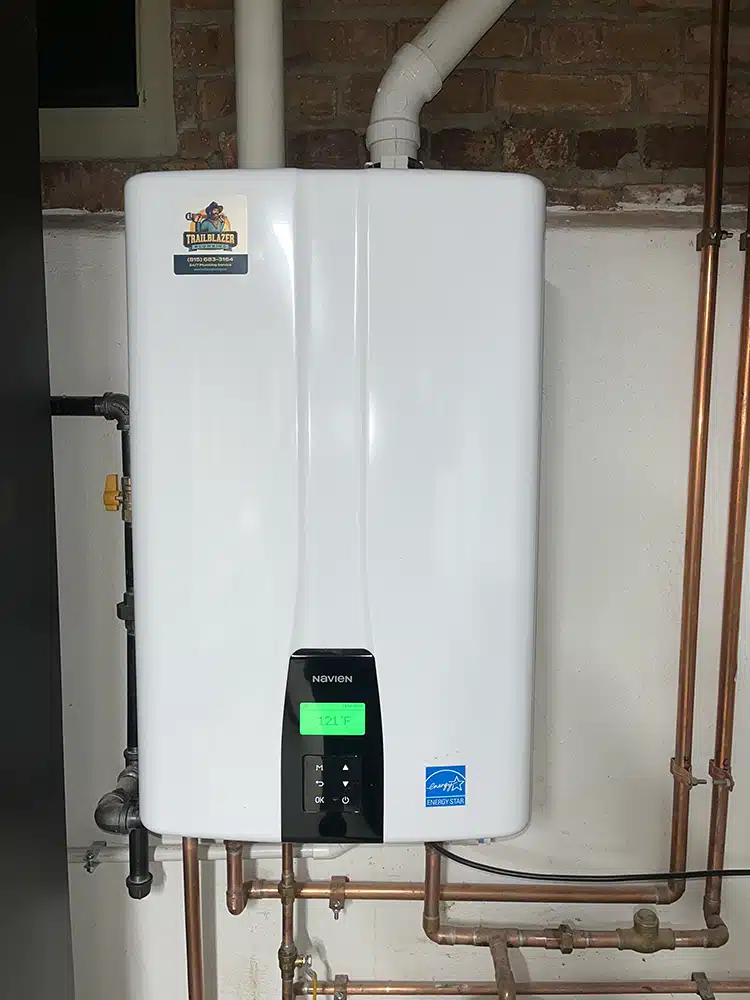Water Heater Repair & Replacement in Joliet
Joliet’s Hot Water Heater Experts
Trailblazer Plumbing is the team to trust when you need water heater services in Joliet. We repair and install traditional and tankless water heaters from a variety of the industry’s top brands, including Bradford White, AO Smith, State, Rheem, and more.
You may need to have your water heater repaired or replaced if you have noticed any of the following problems:
- Hot water runs out after only a few minutes
- Rusty and/or foul-smelling hot water
- Water heater tank or valve is leaking
- Water heater is making unusual noises
- Water heater pilot light won’t stay lit
- No hot water
- Erratic temperature control
The longer you wait to address a problem with your water heater, the longer you’ll be without a reliable source of hot water. Avoid the inconvenience and discomfort by making an appointment with our Joliet plumbers today!
Call (708) 512-4667$50 off Water Heater Installation
Our Joliet Services

Tankless Water Heater
Pros:
- Energy Efficiency: Tankless heaters heat water on-demand, which reduces energy consumption and lowers utility bills by avoiding standby heat loss.
- Continuous Hot Water: Tankless heaters provide a continuous supply of hot water since they heat water as it’s needed.
- Space Saving: Tankless heaters are compact and can be mounted on walls, saving valuable floor space.
- Longer Lifespan: Tankless models tend to have a longer lifespan compared to traditional tanks.
- Reduced Environmental Impact: The lower energy consumption of tankless heaters contributes to a reduced carbon footprint.
Cons:
- Higher Installation Complexity: Depending on your home’s setup, installing a tankless heater might require modifications to gas lines, electrical systems, or venting.
- Potential Flow Rate Limitations: While tankless heaters provide continuous hot water, their flow rate might be limited if multiple hot water outlets are used simultaneously.
- Higher Initial Cost: Tankless water heaters typically have a higher upfront cost, including installation.
How to Choose the Right Water Heater for Your Home
Ready to replace your water heater, but not sure what type to buy? Consider the following factors when deciding between a conventional tank water heater and a tankless water heater:
- Hot Water Demand: If you have a high hot water demand, such as a large family or multiple bathrooms, a tankless heater might be more suitable to provide continuous hot water.
- Energy Efficiency: If energy efficiency and long-term savings are a priority, a tankless heater is a better choice due to reduced energy consumption.
- Initial Budget: Traditional water heaters have a lower upfront cost, which can be appealing if you’re on a tight budget. However, keep in mind the long-term energy savings of a tankless unit.
- Space Availability: If you’re short on space, a tankless heater’s compact size and wall-mounted installation could be advantageous.
- Installation Considerations: Consider the installation requirements and potential modifications needed for a tankless water heater in your home.
- Long-Term Investment: Think about the lifespan and potential maintenance costs associated with each type of heater.
Ultimately, the right choice depends on your specific needs and preferences. Our Joliet water heater experts can assess your unique requirements and determine the most suitable option for you.

Trust Trailblazer for your Joliet Water Heater Services
Call today to work with Joliet’s most trusted water heater repair and replacement plumbers.
Book Service